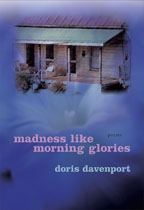
In her enchanting poem sequence, Doris Davenport introduces readers to Soque Street and its "Affrilacian" residents. These African Americans inhabiting an Appalachian community in northeast Georgia live in a world where magic threads daily life and the living and dead commingle. Ghosts, self-propelled caskets, and sensate trees are as natural as morning glories to these characters, who are at once eccentric and universal, peculiar and welcoming.
Spoken in intersecting and overlapping monologues, the poems create a refreshing portrait of small-town life, with its mix of quotidian concerns and the larger experiences of love, passion, grief, jealousy, and madness. The story of Soque Street moves from voice to voice and through poetic forms with ease and confidence. Sometimes frightening, often funny, and always compelling and potent, Madness like Morning Glories is a major achievement by a poet of tremendous originality who possesses an intuition for the subtle secrets of language.
Soque is a Cherokee word turned Black on the Hill
across the railroad track, in Appalachian foothills where
madness like morning glories took over everyone trying to be
insane and acceptable all the time and all the while, hainted.
Two rows of houses along the railroad track
Mr. Oscar Wise, the Peanut Man, and his family
still there in the air and honeysuckles, hainted.
Mack, our cousin, said he saw a casket roll down Soque,
Stop in front of 103 and roll back up the hill again.
—from "Ceremony for 103 Soque Street"
Found an Error? Tell us about it.